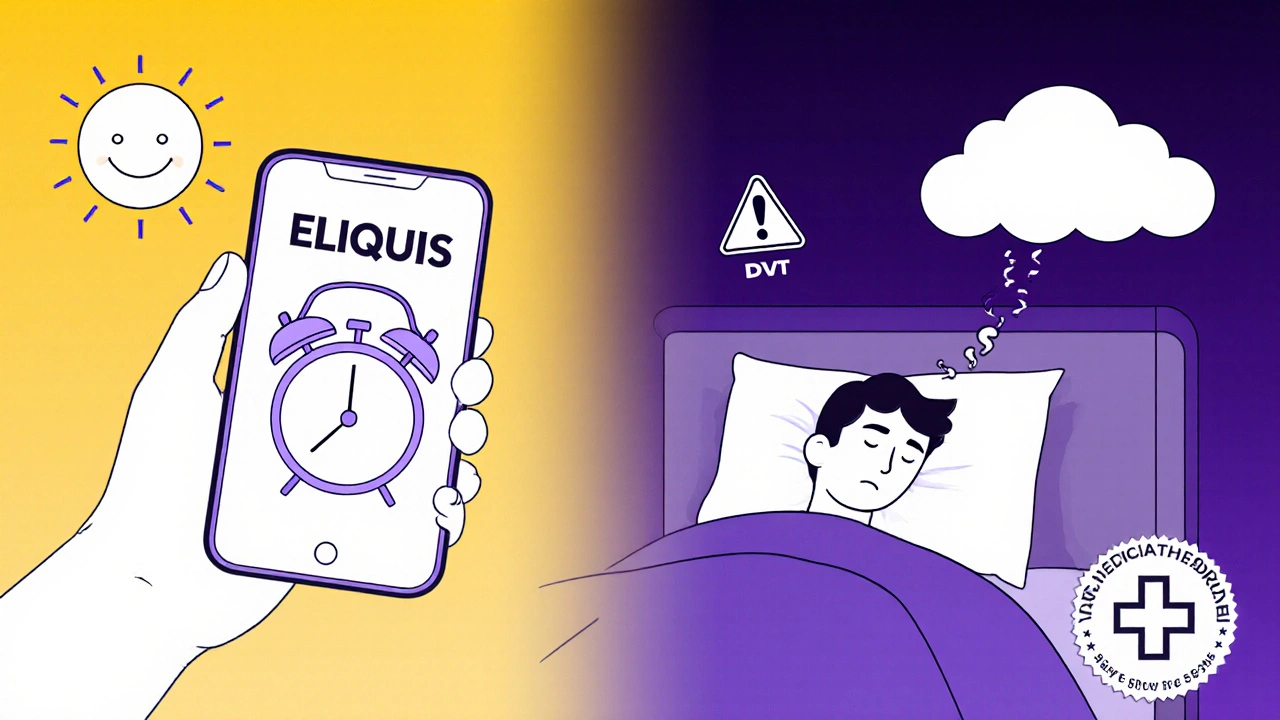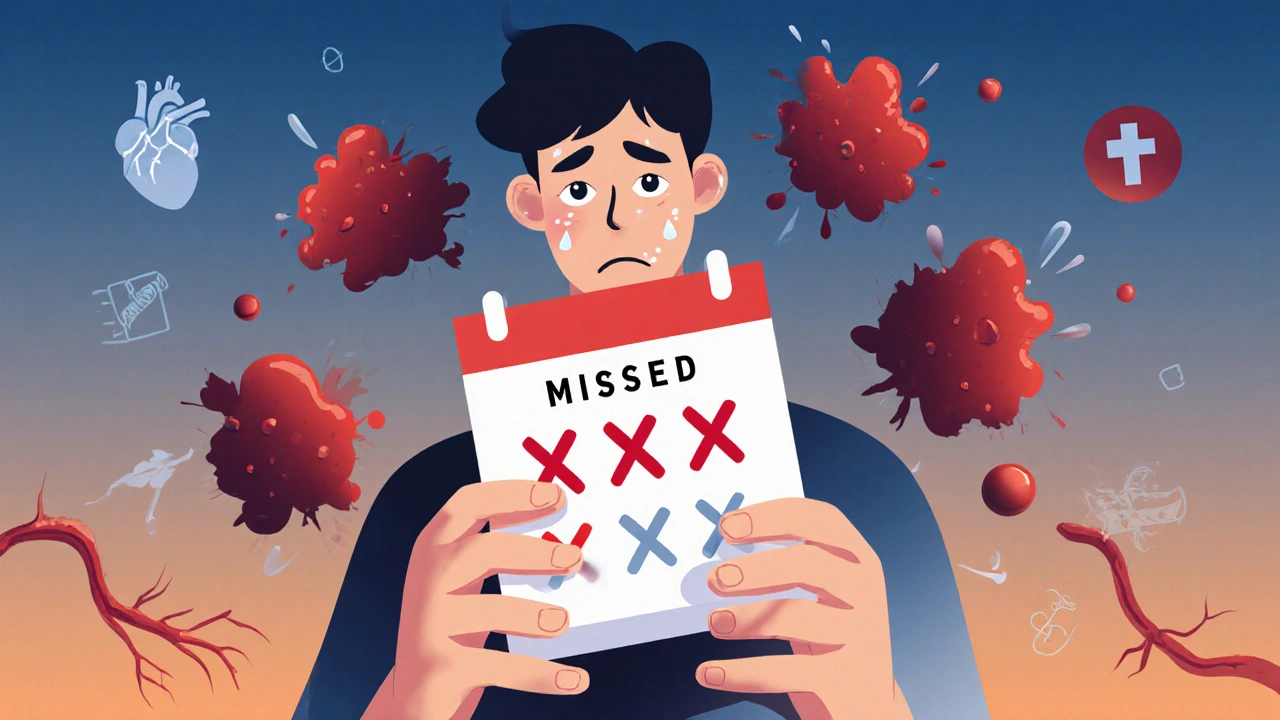Missing a dose of your blood thinner might seem like a small mistake - maybe you were busy, forgot because of a change in routine, or just didn’t feel like taking it that day. But for someone on anticoagulants, skipping even one pill can be dangerous. Blood thinners aren’t optional supplements. They’re life-saving medications that stop dangerous clots from forming in your veins and arteries. When you miss a dose, that protection drops. And if you don’t know what to do next, you could be putting yourself at risk for a stroke, pulmonary embolism, or serious internal bleeding.
Why Missing a Dose Matters
Blood thinners, also called anticoagulants or antiplatelets, don’t actually make your blood thinner. They work by slowing down your body’s ability to form clots. That’s crucial if you have atrial fibrillation, a history of deep vein thrombosis, a mechanical heart valve, or have had a stroke or heart attack. Without these medications, your risk of clotting goes up dramatically. For example, someone with atrial fibrillation who isn’t on anticoagulants has a 1.5% to 6.6% chance each year of having a stroke - and that risk jumps even higher if doses are missed regularly.There are two main types: older drugs like warfarin, and newer ones called DOACs - including apixaban (Eliquis), rivaroxaban (Xarelto), and dabigatran (Pradaxa). Warfarin requires regular blood tests (INR checks) to make sure you’re in the right range. DOACs don’t need those tests, but they have shorter half-lives, meaning they leave your system faster. That makes timing even more critical.
A 2021 study in Circulation: Cardiovascular Quality and Outcomes found that when people took less than 80% of their DOAC doses, their stroke risk went up by 57%. For warfarin, the threshold was lower - 65% adherence - because it sticks around longer in the body. But that doesn’t mean DOACs are safer if you skip doses. In fact, because they clear out faster, missing a pill leaves you unprotected for longer periods between doses.
What Happens When You Miss a Dose
The immediate danger isn’t always obvious. You might not feel anything right away. But inside your body, clotting factors are rising. The longer you go without the medication, the more likely you are to develop a clot.Here’s what can happen if you miss even one dose:
- Increased risk of deep vein thrombosis (DVT) - a clot in your leg that can break loose
- Pulmonary embolism (PE) - when that clot travels to your lungs, causing sudden shortness of breath or chest pain
- Stroke - especially if you have atrial fibrillation
- Internal bleeding - because your blood can’t clot properly when you’re on the medication, but missing doses causes fluctuations that make bleeding unpredictable
Some signs of trouble show up quickly. If you notice:
- Unexplained bruising or large bruises without injury
- Red or brown urine
- Black, tarry stools
- Sudden dizziness, weakness, or confusion
- Severe headache or vision changes
- Shortness of breath or chest pain
These aren’t normal. They could mean internal bleeding or a clot. Don’t wait. Call your doctor or go to urgent care.

What to Do If You Miss a Dose
The rules change depending on what kind of blood thinner you take. There’s no one-size-fits-all answer.For warfarin (Coumadin, Jantoven):
If you remember you missed your dose within 12 hours of when you were supposed to take it, take it right away. If it’s been more than 12 hours, skip it. Do not take two doses the next day. The NHS says if you forget before midnight, you can still take it. After midnight? Skip it. Always write down missed doses in your yellow anticoagulant record book. Tell your clinic at your next INR check.
For apixaban (Eliquis):
If you miss a dose and remember within 6 hours of your usual time, take it right away. If it’s been more than 6 hours, skip it. Never double up. Eliquis is taken twice a day - usually 12 hours apart - so timing matters. If you miss the morning dose and remember at night, take it then. If you remember the next day, skip the missed one and go back to your regular schedule.
For rivaroxaban (Xarelto) or dabigatran (Pradaxa):
Same rule: take it if you remember within 6-12 hours. After that, skip it. Don’t take extra doses. Rivaroxaban is often taken once a day with food. Dabigatran is taken twice daily. Check your specific instructions - your pharmacist can help.
For aspirin or clopidogrel (antiplatelets):
These are usually less time-sensitive. If you miss a dose, take it as soon as you remember. If it’s almost time for the next one, skip it. Never double up. Consistency matters more than exact timing.
Never:
- Take two doses at once to make up for a missed one
- Stop taking your medication without talking to your doctor
- Assume it’s fine because you “felt fine”
Doubling up increases bleeding risk - which can be fatal. Stopping cold turkey increases stroke risk. Both are dangerous.
When to Call for Help
You don’t need to panic over every missed dose. But there are clear red flags.Call your doctor or go to the emergency room if:
- You missed more than one dose in a row
- You took too much by accident
- You fell hard, especially on your head
- You notice any of the bleeding symptoms listed above
- You’re unsure what to do
The NHS and the American Heart Association both say: when in doubt, call. Anticoagulation clinics exist to help you with exactly these situations. They can tell you whether to skip, take, or adjust based on your specific condition and medication.
If you’ve had a fall or head injury while on blood thinners, don’t wait for symptoms. Get checked. A small bleed in the brain can grow silently. That’s why Eliquis’s official guidelines say: “Call your healthcare provider right away if you fall or injure yourself, especially if you hit your head.”

How to Avoid Missing Doses
The best way to handle a missed dose is to never miss one in the first place.Here’s what works:
- Use a pill organizer with days and times marked - especially if you take multiple pills a day
- Set phone alarms for both morning and evening doses
- Link taking your pill to a daily habit - like brushing your teeth or eating breakfast
- Refill your prescription before you run out. Don’t wait until the last day
- Keep your yellow book (for warfarin) or a written log of doses taken and missed
- Ask your pharmacist about medication reminder apps - many are free and sync with your pharmacy
Studies show that people who use reminders have adherence rates above 90%. Those who don’t miss about 1 in 8 doses. For someone on warfarin, that’s 15.7% missing at least one dose a month. For DOACs, it’s still 10.8%. That’s not small. That’s enough to increase your stroke risk.
Final Advice: Talk to Your Team
Your doctor, pharmacist, and anticoagulation clinic are your allies. They’ve seen this before. They know how your body responds. They can adjust your plan if you’re struggling with adherence.Don’t feel guilty about missing a dose. Just be honest. Say: “I missed two doses last week because I was traveling.” Or: “I got confused about when to take it.” That’s how you get help - not by hiding it.
And remember: this isn’t about being perfect. It’s about staying safe. Blood thinners work best when you take them exactly as prescribed. Missed doses create gaps. Gaps create clots. Clots can change your life - or end it.
If you’re worried, call your clinic today. Don’t wait until tomorrow. Your next dose is more than a pill - it’s your protection.
What should I do if I miss a dose of warfarin?
If you remember within 12 hours of your usual time, take the missed dose. If it’s been more than 12 hours, skip it. Never take two doses at once. Always write down missed doses in your yellow anticoagulant record book and mention them at your next INR test.
Can I double up on my blood thinner if I miss a dose?
No. Never double up. Taking two doses increases your risk of serious bleeding - including internal bleeding in your brain, stomach, or other organs. It does not make up for the missed dose and can be life-threatening.
What are the warning signs of bleeding from blood thinners?
Watch for unexplained bruising, red or brown urine, black or tarry stools, vomiting blood, severe headaches, dizziness, confusion, or sudden weakness. These could mean internal bleeding. Call your doctor or go to the emergency room right away.
Do DOACs like Eliquis require blood tests like warfarin?
No. DOACs like apixaban, rivaroxaban, and dabigatran don’t require regular blood tests. But they have shorter half-lives, so timing is more critical. Missing a dose leaves you unprotected faster than with warfarin. Stick to your schedule exactly.
Should I stop taking my blood thinner if I’m going to have surgery?
Never stop without talking to your doctor. Stopping increases your risk of stroke or clot. Your care team will decide whether to pause, reduce, or continue your medication based on the type of surgery and your clot risk. Always bring your medication list and any record books to your pre-op appointment.
How common is it to miss a blood thinner dose?
About 1 in 8 patients miss at least one dose per month. Warfarin users miss doses more often than those on DOACs - around 15.7% vs. 10.8%. But even one missed dose can raise your stroke risk. Consistency is key.







Stacey Whitaker
October 31, 2025 AT 22:13